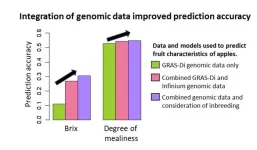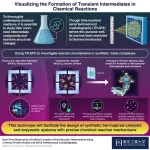Genomic data integration improves prediction accuracy of apple fruit traits!
Researchers reveal genomic data from different genotyping systems can be combined to obtain better genomic predictions of fruit traits at the seedling stage
2024-07-08
(Press-News.org)
Over the past few decades, the world has witnessed tremendous progress in the tools used for genomic analysis. While it’s usually more common to associate these tools with the fields of biology and medicine, they have proven to be very valuable in agriculture as well. Using numerous DNA markers obtained from next-generation sequencing technologies, breeders can make genomic predictions and select promising individuals based on based on their predicted trait values.
Various systems and methodologies aimed at improving the quality of fruits use genetic analysis. One of them consists of genetic selection (GS) and genetic prediction (GP). This modern breeding approach uses statistical models to assess the entire genetic profile of a given individual based on previously collected genomes and their associated traits. This enables breeders to make predictions about the fruit traits that will be produced in the future at the seedling stage. In contrast, genome-wide association studies (GWAS) are instead focused on finding the exact genetic variants that are responsible for a particular fruit trait.
Until now, GP and GWAS have predominantly used DNA markers from a single system, and when the system in use became obsolete, it had to be re-analyzed using a more up-to-date system. However, it has been difficult to re-analyze populations for selection in fruit tree breeding that have been analyzed in previous systems, as it is not possible to re-obtain DNA from individuals discarded during selection. Thus, in a recent study published in Horticulture Research on 8 July 2024, a research team led by Associate Professor Mai F. Minamikawa from the Institute for Advanced Academic Research, Chiba University, Japan, set out to clarify whether combining apple data from different systems could lead to more accurate results when performing GP and GWAS. Other members of the team included Dr. Miyuki Kunihisa from the Institute of Fruit Tree and Tea Science, National Agriculture and Food Research Organization, Japan, and Professor Hiroyoshi Iwata is from the Graduate School of Agricultural and Life Sciences at the University of Tokyo, Japan.
First, the researchers combined apple datasets acquired from two different genotyping systems, namely Infinium and genotyping by random amplicon sequencing direct (GRAS-Di). Then, they used these combined genotype markers to perform GP and GWAS for a total of 24 different fruit traits, including acidity, sweetness, harvest time, and solid soluble content. The team compared the performance of predictions made using models trained on either dataset alone or both combined.
The results were very encouraging; the accuracy of genomic predictions and the detection power of the GWAS system increased significantly when using the Infinium and GRAS-Di combined datasets for multiple fruit traits. This suggests there are benefits to combining data from different systems and leveraging historical data.
To push the envelope further, the researchers also trained the GP model in such a way that inbreeding effects were considered. Interestingly, these results also hinted at the combined approach performing better for certain traits, including Brix and Degree of mealiness. Still, these findings were less conclusive, as Dr. Minamikawa remarks, “Although the accuracy of GS for fruit traits in apples can be improved by data on inbreeding, further studies are needed to understand the relationship between fruit traits and inbreeding.”
Overall, the findings of this study hint at a convenient way of improving the accuracy of GS and GWAS by leveraging existing datasets. This could have many positive implications in agriculture, as Dr. Minamikawa highlights, “The challenges such as large plant size and long juvenile periods in fruit trees can be addressed by identifying superior genotypes from numerous individuals using high accuracy GS as seedling stage and detecting genetic variants for a target trait using precise GWAS.”
Let us hope further progress in this field makes the breeding of fruits more efficient and reliable so we can keep enjoying them in our diets!
About Associate Professor Mai F. Minamikawa
Dr. Minamikawa received a PhD degree from the Graduate School of Horticulture at Chiba University in 2013, where she currently holds the position of Tenure-track Associate Professor. She specializes in genomic selection, data science, and statistical and molecular genetics, with a particular focus on their application to fruit breeding. Worth noting, she is also a member of The Japanese Society of Breeding and The Japanese Society for Horticultural Science.
END
ELSE PRESS RELEASES FROM THIS DATE:
2024-07-08
Immobilizing small synthetic molecules inside protein crystals proves to be a promising avenue for studying intermediate compounds formed during chemical reactions, report scientists from Tokyo Tech. By integrating this method with time-resolved serial femtosecond crystallography, they successfully visualized reaction dynamics and rapid structural changes occurring within reaction centers immobilized inside protein crystals. This innovative strategy holds significant potential for the intelligent design of drugs, catalysts, and functional materials.
Most complex chemical reactions, whether synthetic or biological, do not involve ...
2024-07-08
Prejudice against fat people is endemic in our society and public health initiatives aimed at reducing obesity have only worsened the problem, according to a U.S. academic.
In her new book Why It’s OK To Be Fat, Rekha Nath, an Associate Professor of Philosophy at the University of Alabama, argues for a paradigm shift in how society approaches fatness.
According to Nath, society must stop approaching fatness as a trait to rid the population of, and instead fatness should be approached through the lens of social equality, attending to the systematic ways that society penalizes fat people for their body size.
Nath explains: “Being fat is seen as unattractive, as gross even. ...
2024-07-08
Up on the “roof of the world”, one of the world’s largest ecosystem restoration projects is taking place. The Qinghai-Tibetan Plateau (QTP) in western China is the world’s highest plateau and covers a land area roughly five times the size of France.
Home to thousands of rare plants and wildlife and the source of water for more than 2.5 billion people, this vital ecosystem is under threat.
The region’s grassland is degrading due to climate change and intense livestock grazing. Government ...
2024-07-08
In a new study of politicians’ personalities, humour, charm and raw courage are listed among the most important character traits for successful leaders.
Bill Jones, Honorary Professor of Political Studies at Liverpool Hope University, has combed through biographies and interviewed key political figures to understand the kind of people who enter politics, and strengths and frailties of those who occupy positions of power.
Jones explains: “Why do aspiring politicians embark on such a perilous journey, involving hugely long hours, no real job security and, on occasions, high degrees ...
2024-07-08
A pioneering study, presented today at the ESHRE 40th Annual Meeting in Amsterdam, has revealed that exposure to fine particulate matter (PM) prior to the retrieval of oocytes (eggs) during in vitro fertilisation (IVF) can reduce the odds of achieving a live birth by almost 40% [1].
The study analysed PM10 exposure in the two weeks leading up to oocyte collection, finding that the odds of a live birth decreased by 38% (OR 0.62, 95% CI 0.43-0.89, p=0.010) when comparing the highest quartile of exposure (18.63 to 35.42 µg/m3) to the lowest quartile (7.08 to 12.92 µg/m3).
Conducted ...
2024-07-08
Gestational carriers, also known as surrogates, experience an elevated risk of severe maternal morbidity and adverse pregnancy outcomes compared to women who conceive naturally or through in vitro fertilisation (IVF), according to new research presented today at the ESHRE 40th Annual Meeting in Amsterdam [1].
The population-based study analysed 937,938 singleton births in Ontario, Canada between 2012 and 2021, comparing outcomes among unassisted conceptions, IVF conceptions and gestational carriers.
The findings uncovered marked variations in outcomes across the different conception methods. Gestational carriers faced a severe maternal morbidity rate ...
2024-07-08
New research has demonstrated the effectiveness of a first-in-class oral, non-hormonal drug in increasing embryo implantation, pregnancy and live birth rates among infertile women who are undergoing in vitro fertilization (IVF) or intracytoplasmic sperm injection (ICSI) [1]. The findings, presented today at the ESHRE 40th Annual Meeting in Amsterdam, represent a significant step toward the first therapeutic tool to increase embryo implantation and live birth rate success.
Worldwide, one ...
2024-07-05
A breakthrough for biomedical research promises new insight into immunotherapy development and disease modeling. Scientists at The University of Texas Health Science Center at San Antonio have created a humanized mouse model with a human immune system and a human-like gut microbiome that is capable of mounting specific antibody responses.
The scientists were led by Paolo Casali, MD, University of Texas Ashbel Smith Professor and Distinguished Research Professor, Department of Microbiology, Immunology and Molecular Genetics in the Joe R. and Teresa Lozano Long School of Medicine. Casali has five decades of biomedical research ...
2024-07-05
At the upcoming SIAM Conference on Mathematics of Data Science (MDS24), a diverse mix of professionals from universities, industry, government, and research labs are set to join. The conference will showcase cutting-edge research that advances mathematical, statistical, and computational methods in the context of what we do with data and how to do it better. Presentations will range from foundational theory of data science to diverse applications. A particular focus this year is on the interaction of data science with the broader society in terms of privacy, interpretability, explainability, ...
2024-07-05
Over 5,000 genetic variants that enable certain cancers to thrive have been identified by scientists, along with a potential therapeutic target to treat or even prevent these cancers from developing.
Researchers from the Wellcome Sanger Institute, and their collaborators at The Institute of Cancer Research, London and the University of Cambridge assessed the health impact of all possible genetic changes in the ‘tumour protection’ gene, BAP1. They found around a fifth of these possible changes were pathogenic, significantly increasing the risk of developing ...
LAST 30 PRESS RELEASES:
[Press-News.org] Genomic data integration improves prediction accuracy of apple fruit traits!
Researchers reveal genomic data from different genotyping systems can be combined to obtain better genomic predictions of fruit traits at the seedling stage





